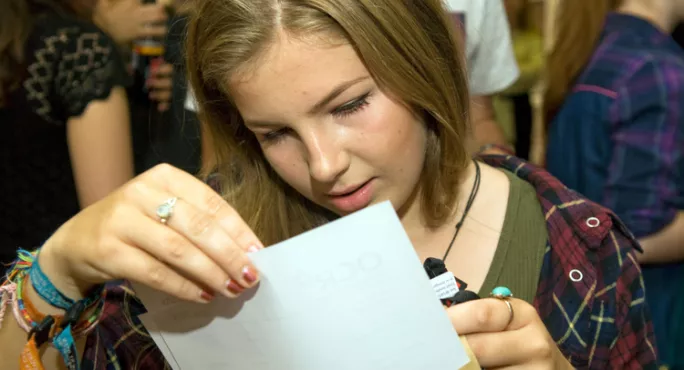- Home
- ‘Don’t trust IGCSE English grades’, private school heads tell admissions officials
‘Don’t trust IGCSE English grades’, private school heads tell admissions officials

Private school headteachers have told Ucas that university admissions tutors should not trust pupils’ results from last year’s English language IGCSEs.
In a letter to Ucas, also addressed to the Medical Schools Council, the Headmasters’ and Headmistresses’ Conference (HMC) and the Girls’ Schools Association (GSA) say pupils’ grades in the qualification are “not safe”.
It is the first time the groups have written to Ucas to warn of concerns about exam results.
‘Major problem’
The groups published a report last week claiming that there was “overwhelming evidence” of a “major problem” in the grading of the English language IGCSE qualification run by the Cambridge International Examinations (CIE) board.
But CIE and the exams watchdog Ofqual said the grading was correct and accused the headteachers’ groups of basing their findings on an unrepresentative sample of schools that were unhappy with their results.
In the letter to Ucas, published today, the groups say are concerned that a “large number” of state and private school pupils may miss out on places on competitive degree courses “on the basis of a false grade”.
The HMC has advised schools whose pupils had scored lower-than-expected grades to use its references on pupils’ Ucas forms to draw attention to concerns about the grades.
Critical for young people’s futures
State school heads said they shared HMC’s concerns about the accuracy of the results, which in “many cases” did not match predicted grades.
Malcolm Trobe, interim general secretary of the Association of School and College Leaders, told TES: “This is of deep concern as it is so important to the futures of these young people. It is particularly critical because qualification reforms mean many of them will not be taking AS levels and so there will be more emphasis on GCSE results in university applications.
“We hope universities and employers will take note of this issue to ensure that these students are not disadvantaged when their applications are considered.”
Last week’s report claims there are “huge disparities” between pupils’ results in the IGCSE and their results in other GCSEs. Grades on one of the qualification’s two papers - worth half the overall marks - are “completely out of line with the abilities of the candidates”, the report says.
‘Rigorous analysis’
Caroline Jordan, president of the GSA and headteacher of Headington School, an independent day and boarding school in Oxford, said: “Schools have suspected for months that last summer’s Cambridge IGCSE English Language candidates received the wrong grade and now this rigorous statistical analysis has proven it.
“Schools cannot allow mistakes of this kind to prejudice the life chances of able and conscientious students when it comes to university applications. It is for this reason that we have today alerted Ucas and the Medical Schools Council to the problem as well as the steps we are taking to address it.”
Ucas chief executive Mary Curnock Cook said the admissions service was “not in a position to comment on grades awarded by particular exam bodies”. However, she said: “The HMC [and] GSA can advise their members to highlight any concerns in individual applicants’ Ucas references.”
Not possible to make adjustments
A spokesman for the Medical Schools Council indicated that, despite the letter, many of its members would be unable to treat IGCSE grades differently from other GCSEs.
“The Medical Schools Council agrees with the HMC that the concerns raised in the report should be taken seriously, and that the situation of those candidates who may need to retake the assessment is highly regrettable,” he said. “Medical schools do not have the expertise, capability or resources to make adjustments for particular candidates’ performance in a level 2 English Language qualification.”
Roderic Gillespie, director of assessment at CIE, said: “We take very seriously our duty to ensure that all the exams our students take are fair, and that all students receive the right grade.
“We are confident that we have done this for IGCSE First Language English. Ofqual has reinforced this in its report published last week, which found the grade boundaries to be suitable and which reiterated its view that we had made appropriate awarding decisions.”
An Ofqual spokeswoman said the watchdog had looked “thoroughly” at the board’s IGCSE award and was “satisfied that the grade boundaries were suitable and outcomes appropriate”.
She said it was “unreasonable” of HMC to “make assertions about an entire cohort of students based on the results of an unrepresentative subset of schools”.
Want to keep up with the latest education news and opinion? Follow TES on Twitter and like TES on Facebook
Keep reading for just £1 per month
You've reached your limit of free articles this month. Subscribe for £1 per month for three months and get:
- Unlimited access to all Tes magazine content
- Exclusive subscriber-only stories
- Award-winning email newsletters



